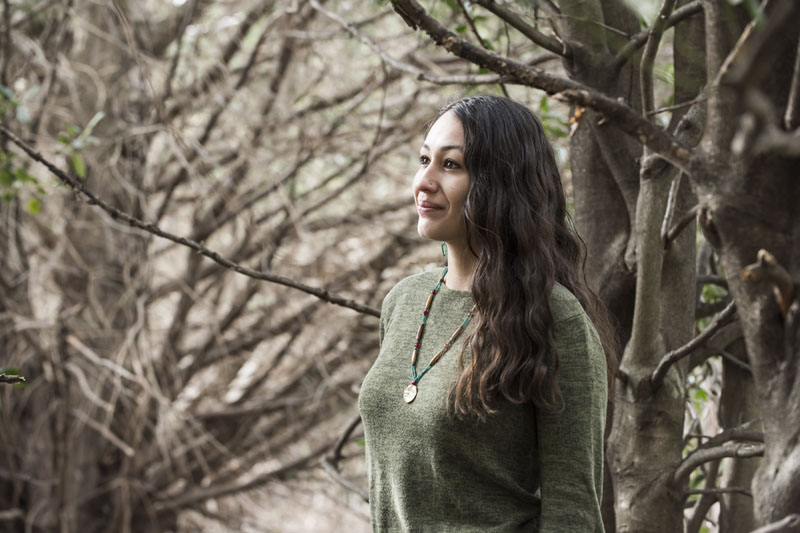
Zintkala Eiring is graduating from George Mason University this month with a bachelor of science in integrative studies with a concentration in applied conservation. She is also a member of the Oglala Lakota Tribe of South Dakota. Photo by Ron Aira.
When she was 5 years old, a medicine man gave Zintkala Eiring her second name during an Oglala Lakota Tribe naming ceremony: Wacante Oganate Win.
“It means, ‘She who helps with her heart,’ ” said Eiring, a George Mason University senior graduating this month with a bachelor of science in integrative studies with a concentration in applied global conservation.
“I feel like conservation is my purpose in life. I think my medicine man knew my purpose before I did,” she said.
Eiring, a member of the Oglala Lakota Sioux Tribe of the Pine Ridge Indian Reservation, South Dakota, has used her passion for her heritage as a basis for several courses, projects and experiences at George Mason.
She has done much to promote traditional ecological knowledge, environmental preservation and stewardship.
“My culture believes all living beings have a spirit; it’s almost my duty as a Lakota to care for the environment and to protect it,” she said. “My ancestors were the original stewards of the environment. That’s why I’m studying conservation.”
At Mason, she’s focused on uranium contamination in drinking water and on sacred areas of her ancestral land, including writing an essay about the human cost of environmental destruction.
She said that many people in South Dakota have well water, including her grandmother. Her grandmother’s well water is clean, but water in other wells is highly contaminated from old uranium mines, leading the tribe to purchase water from other states.
Eiring’s project for her Introduction to Geographic Information Systems class focused on tribal lands’ spatial proximity to sacred lands of the Lakota, or federally recognized protected areas like Black Hills National Forest.
Eiring was vice president of the Native American and Indigenous Alliance at Mason, where she was responsible for hosting the 14th Annual Veterans Day Pow Wow. She surveyed bats as an intern with the National Park Service’s Prince William Forest Park in Virginia, conducting surveys to assess the presence of white-nose syndrome in the bat species. She also spent a semester studying wildlife ecology at the Smithsonian-Mason School of Conservation where she analyzed and identified bat species’ echolocation calls using bioacoustics. In addition, she served as animal keeper practicum student for clouded leopards and red pandas.
Eiring is enrolled in the Native American Political Leadership Program at George Washington University’s Semester in Washington program. Afterward, she will serve as a junior tribal liaison for the U.S. Fish and Wildlife Service's northeast regional headquarters in Hadley, Mass. Her future plans include obtaining a master's in environmental science and policy.
